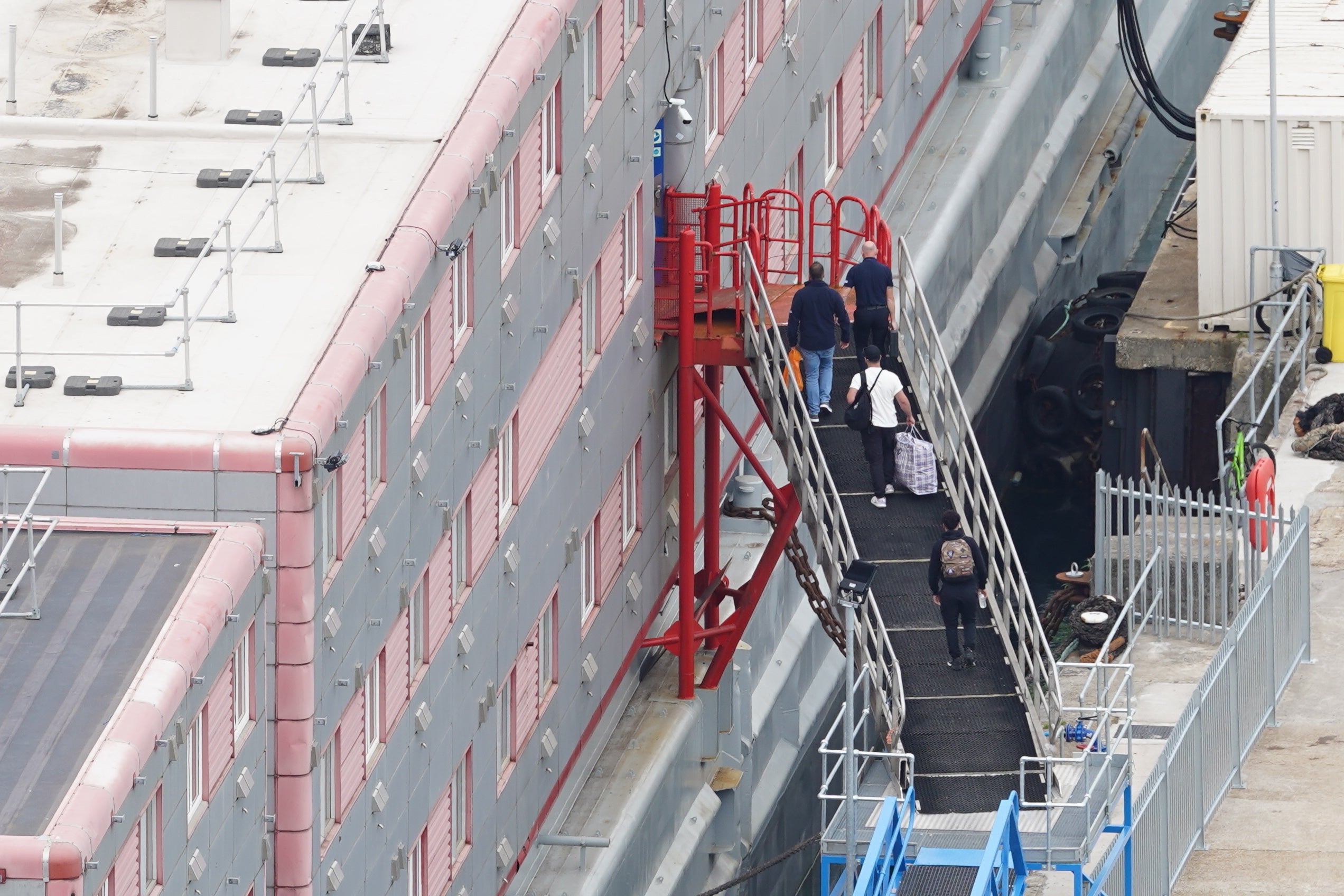This migrant barge is a feeble response to a global challenge
Editorial: ‘Bibby Stockholm’ is a piece of performative politics that distracts from the wider problem of growing worldwide migration

Bibby Stockholm, the accommodation barge that will eventually hold around 500 refugees, will make no measurable difference to the migration crisis. The numbers involved are tiny in relation to the roughly 45,000 irregular migrants who crossed the English Channel last year.
Grim as some say the conditions on board are, they are unlikely to be horrific enough to serve as a significant deterrent to anyone fleeing for their lives, or even economic migrants looking for work and an opportunity to transform their existence. The chances of anyone embarking from the French coast on a dinghy ending up moored on this modern-day hulk off the coast of Dorset are vanishingly small.
Indeed, much the same could be said of the various other government schemes to house the 74,000 people already in the country and awaiting processing. Former military barracks; shanty town-style tent settlements; deportation to Rwanda or, now rumoured, the minute mid-Atlantic islet of Ascension – all utterly unsuitable and all signs of a government desperate to be seen to be doing something, or anything, no matter how ineffective.
Even taken together they would cater for perhaps one week or a month’s arrivals on small boats. Moreover, no one believes that any of these arbitrary, small-scale and often inhumane projects are the answer to the challenges mass migration will present in the coming decades. What is being experienced now is merely a prelude, the beginning not the end of the crisis, thanks to geopolitical instability, growing economic inequalities and the creeping but dramatic effects of climate change.
Understandably, there is much attention on the Bibby Stockholm, and conditions on board are the subject of intense scrutiny. This hulking, floating grey lump of a vessel is a dismal symbol of national failure, if not shame. The government has said it will be cheaper to accommodate people on the barge than it is to billet them in hotels but refuses to say how large that financial saving is expected to be. Then there is the fiasco of the Home Office tripping over its own suitability guidelines on the very day it boards the first unfortunate occupants. The barge will be used at double its intended capacity, the young men sharing small rooms. The Independent has calculated that each will have on average less living space than an average car parking bay, even when taking shared spaces and outdoor courtyards into account.
They will be free to come and go, with a bus service to Weymouth laid on, but otherwise the atmosphere may be more like that of a detention centre. As a quasi-open prison, security guards will be on board at all hours, including some with a military background, who have been trained for a range of scenarios including potential disputes and fights. Just as well: tensions among random groups thrown together against their will, tightly packed and in a mood of some despondency would seem likely to lead to violence, and the possibility of grave disorder, as has happened in onshore detention centres.
Not only is this bizarre vessel inadequate for the immediate task, but it distorts our perspectives. It is a piece of performative politics, and not an entirely convincing one – but, worse, it is in truth a distraction. The coming years and decades will witness huge movements of humanity, crossing continents on a scale perhaps never before witnessed in human history. Wars, civil wars, the rise of terrorist entities such as al-Qaeda and Islamic State, deforestation, extreme weather and rising sea levels because of climate change – all will propel people from their homes and into the unknown.
The end of the Cold War did not, in the end, yield the end of history. In Europe, Russia’s invasion of Ukraine has created the largest westward migration since the end of the Second World War. Chronic instability in a great arc of states from the Sahel through the Horn of Africa, across Syria, Iraq, Iran and on to Afghanistan has destroyed cities, broken nations and displaced millions. The conflict in South Sudan has created two million refugees, with a million in Uganda, a country ill-prepared for such an influx.
It is a feature of these contemporary crises that the brunt of the impact is felt on poorer neighbouring countries: Jordan, for Syrians; Bangladesh for Rohingya people fleeing persecution in Myanmar; Colombia for Venezuelans. America tried a wall; Europe has its Mediterranean patrols; Australia sent its would-be migrants to far-way Cambodia. Yet, whatever success these tactical manoeuvres have seen, they haven’t stopped the flow of people, and nor could they. Who can say what war in Taiwan or the collapse of the ayatollahs might bring, let alone some probing raids by Putin proxies into Nato territory.
Britain can’t do much more than its neighbours in the face of such long-term migration. True, the English Channel provides something of a natural barrier, but recent history shows how futile traditional geographical obstacles are. Civilised, open economies cannot operate like, say, North Korea, hermetically sealed behind a “zero migration” policy. Britain, like the West as a whole, must ask itself searching questions about how it can honour its moral and legal obligations to offer shelter to the persecuted when those numbers may soon prove unprecedented and on a scale unthinkable even a decade or two ago.
That is not to say that such obligations that exist under the human rights conventions should be abandoned, for they guarantee and protect those inalienable rights as they apply to British citizens, as well as those who wish to settle. It is a plea to at least face up to the enormity of mass migration and try to find a consensus on how Britain should respond.



Join our commenting forum
Join thought-provoking conversations, follow other Independent readers and see their replies
Comments